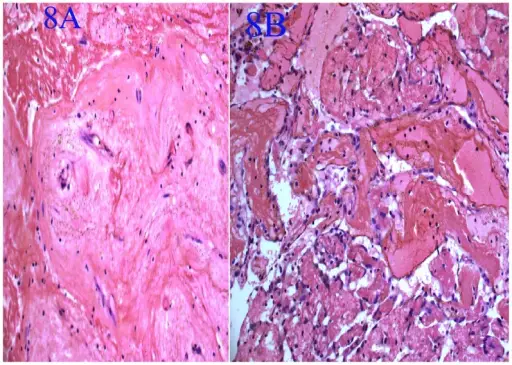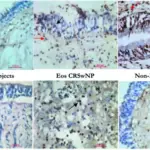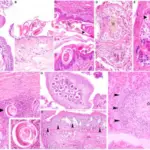Nasal polyps are pedunculated grape-like masses of tissue. Recurrent bouts of rhinitis may lead to nasal polyps.
What is the Pathology of Nasal Polyps?
The pathology of nasal polyps is:
-Etiology: The cause of nasal polyps is chronic inflammation (rhinitis).
-Genes involved: mucin (MUC)5AC, MUC5B, and MUC2 genes.
-Pathogenesis: The sequence of events that lead to nasal polyps remains unclear.
-Histology: The histology associated with nasal polyps shows edematous connective tissue comprising some mucous glands and the variable number of inflammatory cells plasma cells, lymphocytes, and eosinophils. Allergic polyps partake plenty of eosinophils and also hyperplasia of mucous glands.
How does Nasal Polyps Present?
Patients with nasal polyps typically, the male-to-female ratio is 2-4:1 in adults. Present at age range of older than 20years Common in the generation of 40 years and above. The symptoms, features, and clinical findings associated with nasal polyps include Chronic or recurrent acute sinusitis symptoms and signs. headaches, postnasal drainage, snoring airway obstruction, chronic mouth breathing, dull, and rhinorrhea.
How is Nasal Polyps Diagnosed?
Nasal polyps is diagnosed through, medical history and physical examination. Laboratory studies including; sweat chloride test, nasal smear, and serologic radioallergosorbent test. Imaging studies, maxillofacial CT scan, and MRI.
How is Nasal Polyps Treated?
Nasal polyps is treated through medical care; Oral/topical nasal steroid therapy, and leukotriene receptor antagonist, analgesic. Surgical intervention, endoscopic sinus surgery, and polypectomy.
What is the Prognosis of Nasal Polyps?
The prognosis of nasal polyps is fair recurrence following medical/surgical treatment usually common in case of multiple benign polyps.



